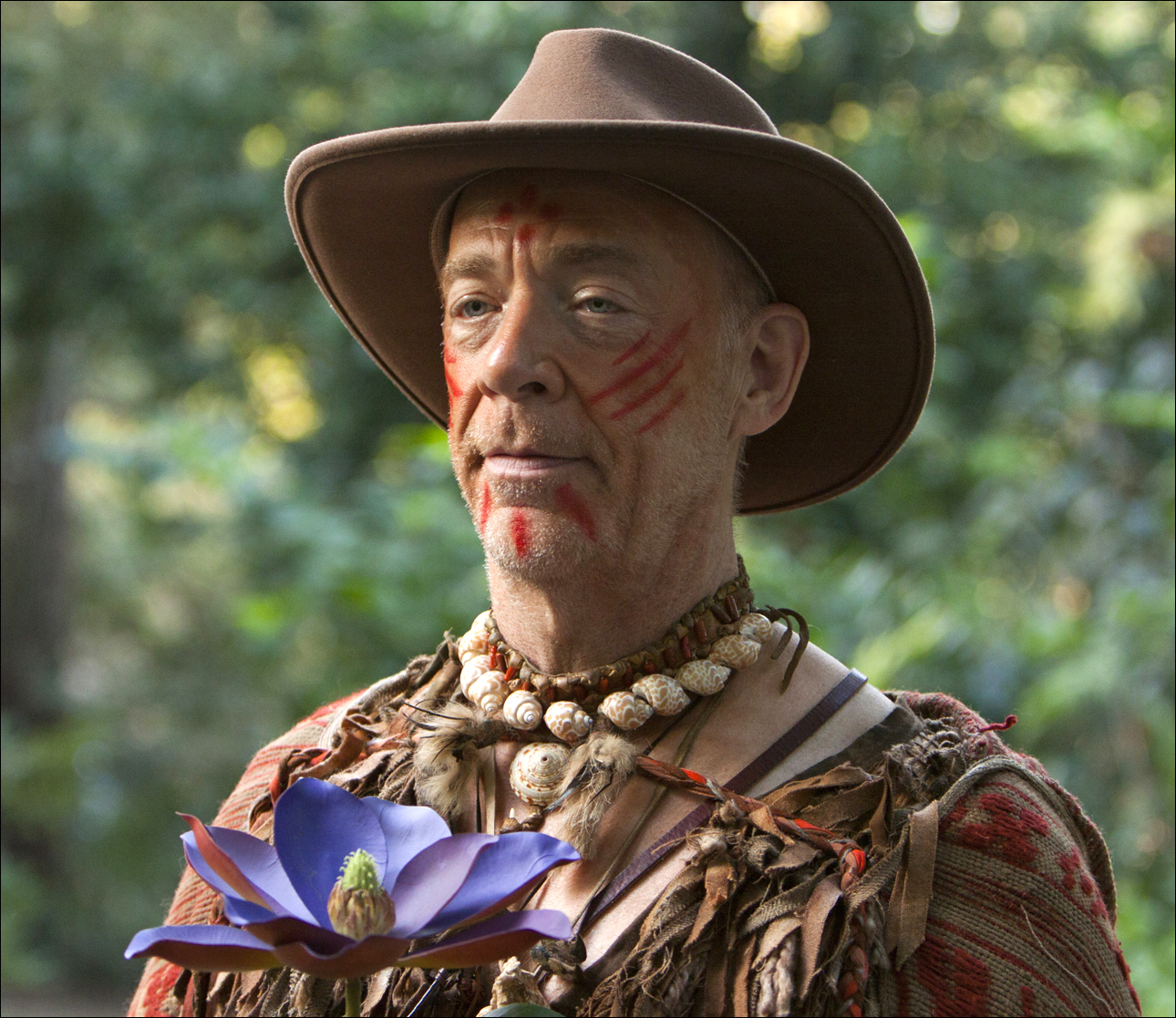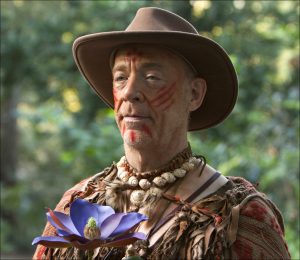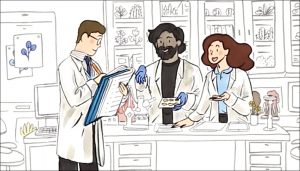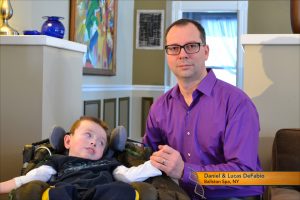At Boston Rare Disease Film Festival, Mitochondrial Disease Makes It to Big Screen

Academy Award-winning actor J.K. Simmons in the short film "The Magic Bracelet," directed by Jon Pol. The film addresses mitochondrial disease. (Photo courtesy of Rare Disease Film Festival)
One film tells a story written by Rina Goldberg, the exuberant Philadelphia teenager who never gave up on life — even after mitochondrial disease left her unable to walk, read, remember the past and, finally, to breathe.
The other is a sobering, seven-minute look at mitochondrial disease from the perspective of the patients, families and doctors who struggle with it in a daily basis.
Early next month, both movies will be shown during the Rare Disease Film Festival — a first-of-its-kind event set for Oct. 2–3 in Boston.
Rina’s film, “The Magic Bracelet,” is a whimsical look at a girl with mitochondrial disease who inherits a mystical totem bracelet from a friend who died of that same illness.
Rina’s motto — “Love life, dream big, be positive” — shines through this film, starring Bailee Madison (“Parental Guidance”), Hailee Steinfeld (Academy Award nominee, “True Grit”), Kaitlin Doubleday (“Catch Me If You Can”), Jackson Rathbone (“Twilight” franchise), J.K. Simmons (Academy Award winner, “Whiplash”) and James Van Der Beek (“Dawson’s Creek”).
The film was adapted by Academy Award-winner Diablo Cody (“Juno”) and directed by Jon Poll (“Charlie Bartlett”). It represents Rina’s dying wish — that somebody of Hollywood caliber would one day turn her script into a movie.
“Even as a debilitating disease shut her body down, Rina refused to let her spirit suffocate,” a Philadelphia newspaper, “Jewish Exponent,” wrote in an article about the film in 2012, the year it was released. “Frail and homebound, she plugged away at a movie script that a family friend had inspired her to start, determined that it would one day make it to the big screen.”
Rina’s parents, Ari and Stacey Goldberg, enlisted the help of the Los Angeles-based Make-A-Film Foundation to put the production together.
“Thank you, Mitoaction, for sharing this important and exciting upcoming festival, where our friends in the Boston area and those participating in the medical conference in tandem with the festival can get a chance to see this great block of films to raise awareness about mito in a positive way, through film,” states the movie’s official Facebook page.
In Ohio, where Rina’s parents now live, September is officially Ohio Mito Awareness Month.
“The power of bringing together film, science and rare disease families leads to renewed hope for all those given a one in a million diagnosis,” said filmmaker Gareth Burghes, whose documentary, “Life & Atrophy,” will also be screened at the Boston event. “Disorder is a film festival that finds the common ground on rare diseases, empowering all those affected.”
Rina, who died in 2010 at the age of 15, entered NYU Hospital for a scheduled major surgery just as the first plane hit the World Trade Center on 9/11. Her surgery had to be postponed, but was the first one performed at the hospital after the 2001 terrorist attacks, during which her family remained at her side.
“What they experienced is very much part of Rina’s story and message, witnessing the fragility of life, acts of compassion, heroism in a city that was changed forever,” the Facebook page says. “In the recent wake of such devastation caused by Hurricane Harvey and Irma, and thoughts of 9/11, our hearts are with all those impacted. Take Rina’s message into action by leading with heart to spread love and compassion to others, and continue to repair the world.”
The second film, “This is Mito,” was directed by Jon Dorflinger of New York’s Saratoga Film Academy, who has worked with a number of Hollywood giants including Tom Hanks, Steven Spielberg and Jeff Bridges.
Both movies will be shown Oct. 3 at 2 p.m. at the Brattle Theatre in nearby Cambridge. Following the screening will be a talk by Dekel Gelbman, CEO of FDNA, a Boston-based company that uses facial analysis to help diagnose rare disorders.
The festival covers more than two dozen rare diseases, and features 30 films to be shown at seven scheduled screenings. They range in length from one to 65 minutes.
The Boston festival is the brainchild of two fathers.
Daniel DeFabio’s son has Menkes disease, a very rare disorder that affects only one in 100,000 newborns. Bo Bigelow’s daughter Tess, 7, has a genetic disease that’s even more rare. Only 23 people worldwide have it; there isn’t even a name to describe her illness.
Several years ago, DeFabio — also a filmmaker — did a documentary to bring awareness to his son’s disorder.
“My experience submitting to various film festivals made me realize that while a few festivals might have a focus on science or medicine, there weren’t any festivals dedicated to rare disease. And while medical conferences were in some ways the ideal place to screen a rare disease film, film screenings tend to be an exception there, a rarity,” DeFabio told Mitochondrial News Today.
“Bo and I began to think: what if there was a film festival that combined the general interest from the public of a typical festival with the more motivated specific interest from advocates, industry and researchers found at a conference?”
Together, the two dads established Disorder: The Rare Disease Film Festival.
“We decided to host the event in a city where neither of us lived but each had to travel to for advanced care for our children: Boston,” DeFabio said. “The concentration of medical, research, bio-tech and genetic professionals in that city meant we’d be going where our best audience already was. The response to our idea has been overwhelmingly enthusiastic.”
Between the slates of films, rare disease researchers and patient advocates will also share stories from their experience. The event has support from the National Organization for Rare Disorders, The Mighty, RDUF, MassBio, Global Genes, Rare Genomics Institute, and Magic Wheelchair, and several pharmaceutical companies including Shire, Vertex and Sanofi-Genzyme.
Bigelow worked for 10 years as a New York consumer protection lawyer. Tess is one of only 23 confirmed people worldwide with the USP7 genetic mutation. “She has significant cognitive delay, she doesn’t know her own name, she’s non-verbal, she has autism and vision issues and she has gastrointestinal reflux disease.”
The former attorney, who now stays home caring for Tess, said the film festival is the best way he knows of bringing attention to diseases most Americans have never heard of.
“We are not trying to make any money with this,” Bigelow said. “We’re just trying to tell our stories and promote the festival. Hopefully, tickets will cover our costs.”










